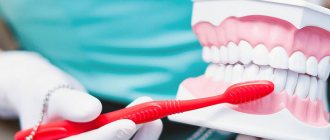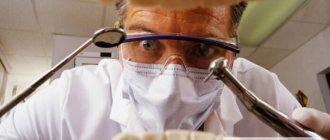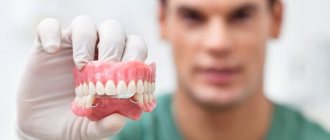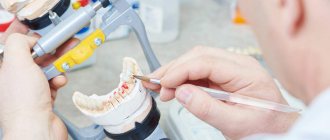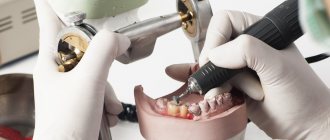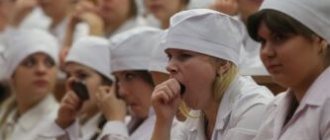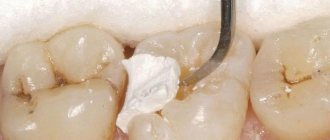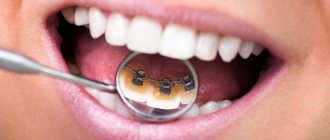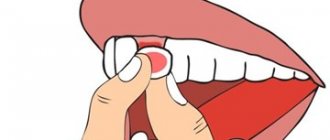What profession could a modern person not imagine his life without? Every day we meet hundreds of representatives of different fields, but day X comes, and then we start thinking about those specialists whom many are afraid of. We are, of course, talking about dentists. Many are afraid of these doctors and endure toothache to the last, so today we decided to tell you more about the dental profession and prove that these are wonderful and kind people who wish their patients only goodness and health. What specializations exist in dentistry, does this profession have pros and cons, and where should you go to study to become a dentist? The dentist-therapist answered all our questions Elena Bobkova.
Who is a dentist?
A dentist is first and foremost a doctor, a specialist in the field of problems of the oral cavity and maxillofacial area.
He checks the condition of teeth and treats patients, advises on issues of implantation, growth, changing teeth, and gives recommendations on further oral care.
Characteristics of the profession - what it does, functions and responsibilities
Let's see what specializations dentists have:
- The therapist is the doctor to whom you turn first. The general practitioner analyzes the general condition of the teeth. Finds problem areas, treats caries, removes nerves, puts fillings and restorations, and prepares teeth for prosthetics.
- The surgeon performs operations in the oral cavity: removes teeth, restores the jaw after injuries, prepares the oral cavity for implantation, prosthetics, orthodontic and orthopedic treatment. Deals with problems related to inflammatory processes, cysts and tumors.
- The orthodontist corrects malocclusion - a situation where the jaws do not close evenly, but with a deviation to the right or left, corrects the curvature of the teeth - increased crowding, in which the teeth have “not enough space” and they run into each other or vice versa. The result of his work carries an important aesthetic point for the patient.
- Orthopedist – comes to the rescue when teeth are missing. Restores them with the help of dentures, removable or permanent, and fully reproduces the important chewing function. If it was possible to save a small part of the tooth, then it uses restoration technology using a crown. This doctor works in tandem with a dental technician - a specialist in the manufacture of dentures and prosthetic elements for a specific case.
- Hygienist is a relatively new field. Monitors the cleanliness of the oral cavity, carries out preventive and hygienic procedures to maintain oral health. Removes plaque, tartar, polishes enamel. Provides consultations regarding the prevention of dental diseases.
- Implantologist – specializes in restoring lost teeth using implants. Innovative technology allows you to install tooth analogues that are no different from real ones. Conducts a full examination, preparation in several stages and the implantation itself. Observes the patient throughout the entire period of rehabilitation after the intervention.
- A pediatric dentist is a doctor who deals with children's dental problems. Removes and treats baby teeth so that the molars are formed healthy, puts fillings, fights diseases associated with the oral cavity, which children are prone to at an early age. A pediatric dentist should not be a doctor, but a kind wizard who will convince the child to treat his teeth and be able to perform all the manipulations without tears.
Anastasia Sipovskaya
age 32 years education St. Petersburg State Medical University named after. Academician I.P. Pavlov (specialty dentist), internship in the specialty “dentistry”; North-Western State Medical University named after. Mechnikova, residency in the specialty "orthodontics" Profession dentist-orthodontist Place of work I work in several clinics, including "Unident" About the profession Orthodontics is a branch of dentistry that deals with the correction of bite, ranging from dynamic observation of the smallest to serious complex treatment of adults and even some older people.What a dentist should know and be able to do - personal qualities and skills
First of all, have a great desire to help people. There is no person who has never had a dental problem.
The doctor must find an approach to everyone, convey the need for the procedures performed and set them up for a positive outcome. Calm and support.
The profession is associated with the ability to work with a large amount of information at the initial stage; in the future, it is important to be able to successfully combine knowledge with practice. This is the basis for making a diagnosis - a decisive role in dental treatment.
A lot of daily work awaits the future specialist. The profession implies constant improvement and training, because modern dentistry does not stand still, new types of treatment appear every year.
This is important: a modern doctor must not only know about innovations, but also be able to apply them in practice.
The desire for perfectionism.
Perfectionism is the desire to achieve an ideal. It is necessary to develop a tendency towards perfectionism, because professionals who have achieved success in their field do not pursue big finances, but, above all, quality results. The best dental specialists focus on achieving impeccable quality of work performed, avoiding any slightest defects. A careless attitude to work will not allow you to achieve high performance. It is especially important for novice dentists to develop patience and a demanding attitude towards themselves.
What subjects need to be taken
To enter the Department of Dentistry, students must pass mandatory exams in the subjects of biology and chemistry. An additional subject from the university and one of the applicant’s choice are also taken.
It is advisable to have at least a basic knowledge of Latin, which is the basis in medical terms. After 9th grade, you can go to college, where the requirements for OGE scores are much lower.
Like any university, medical schools have paid training (for those who do not pass the test) and budget training (available to certain categories of people and high-impact students whose Unified State Exam scores are close to 300).
The answer to the question of how much tuition costs should be found on the website of a specific university.
Obtaining medical education
Perhaps the most responsible and time-consuming process is preparing for admission to a university. It is necessary to take on it as early as possible - ideally several years before an important event. After all, any prestigious profession is in great demand and implies high competition for places. Therefore, it would be useful to take additional classes and electives. Applicants will have to write the Unified State Exam in the Russian language, chemistry and biology or provide the results of passing them at school (not accepted everywhere). Accordingly, there is no way to do without knowledge of these disciplines. The passing score for the exams can be viewed on the official website of the university.
It is worth noting that upon admission, basic medical knowledge is encouraged. Therefore, a diploma from a specialized college will be an additional bonus. Over the years of studying at a university, students will gain a huge amount of general medical knowledge. Often, information will have to be memorized in entire blocks. After all, the level of professionalism, and therefore the effectiveness of treatment, directly depends on how much a specialist understands issues of physiology and anatomy.
When answering the question of what it takes to become a dentist, it is necessary to mention the presence of practice in medical institutions. After the first year, students will be able to try their hand as junior staff at clinics. Further practice involves independent medical practice under the supervision of existing specialists. By the fifth year, students will have to decide on a specific area of dentistry.
Upon graduation, the graduate receives a diploma of higher education without the right to practice medicine. The document indicates possession of relevant knowledge and completion of a theoretical course. After successfully passing the exams, the dean’s office issues a “ticket” to the internship. This concept implies the primary postgraduate specialization of graduates in the chosen field.
Many students consider internship the most challenging and interesting period of their studies. It takes place in a dental clinic under the guidance of experienced mentors. After a year of practice, a certificate for the right to provide medical services is awarded. To obtain the status of a specialist in a narrower profile or occupy an administrative position, you must complete a residency. Thus, to become a good dentist, you will have to devote about 7-10 years to training. In addition, current specialists will need to constantly take advanced training courses.
Which universities offer training in this specialty?
According to statistics, medical education in Russia is of the highest quality, and this is the key to a healthy nation. There are no special dental universities in our country.
Almost every medical school is recruiting for the Faculty of Dentistry. Depending on the chosen educational institution, different forms of education will be offered: full-time, part-time, evening.
You can enroll after 11th grade. This specialty is also offered by medical technical schools and colleges, which can be entered after completing 9 grades.
As a rule, all educational institutions have budget places. To take them, you need to have a high score on the Unified State Examination, otherwise the cost of training will fluctuate up to 400 thousand for leading universities in Moscow and St. Petersburg and on average up to 250 thousand in the regions. Education in technical schools and colleges costs an order of magnitude lower.
Studies
Having relaxed after passing the entrance exams, it was difficult to get used to the freedom of choice, high workload and responsibility. By the end of the first year, I had accumulated 45 detentions and could have easily flunked out due to physics. With grief in half, I went to the session for the third exam. After this, it’s easier to study, although up to the “equator” the loads are serious. In my opinion, we were taught general subjects well, but in the specialty there were a lot of freebies. Practical classes are weak; we were allowed to work independently only in therapeutic dentistry, and then on old Soviet installations with a minimal set of tools. Summer practice helped: if you managed to get a job in a regular public clinic.
As terrible as it sounds, until you started doing something with your own hands on real patients, you did not become a doctor
I read most books and textbooks and articles when the work process began; this is the only way to become motivated to study more thoroughly and, most importantly, understand the theory.
Now every medical university has the opportunity to study to become a dentist; people with a secondary medical education can enroll faster and easier (there is an evening department and shortened programs). You can work as an orthodontist only after internship (general dentistry) and a two-year residency. Now there are a lot of specialists in our profession, although 10 years ago orthodontics was a rare specialty: ten people graduated per year, of whom a maximum of five were employed in the specialty, the rest worked as both therapists and orthodontists, this is simply more profitable in the beginning.
Where can a dentist work?
Commercial dentistry is now leading the way in providing jobs. The state is pursuing a policy that supports medical workers, providing decent wages, high pensions and the opportunity to purchase subsidized housing.
This profession will always be popular and relevant, because every person has been a patient of a dentist for almost his entire life.
How much do dentists earn?
The average salary in public dentistry is 25 - 50 thousand rubles per month , bonuses and subsidies are paid, depending on the length of service and qualifications of the doctor.
Commercial clients provide the opportunity to earn from 40 to 150 thousand rubles. These figures vary depending on the region.
Career growth of a dentist
Dentists are divided into categories: first, second and highest. To confirm the first category, you need experience (three years), protection of the following categories after seven and ten years, respectively.
Confirmation is carried out before the commission with a report on the work done. To advance up the career ladder, you need to be a talented and hardworking doctor; your merits will not go unnoticed.
Is it worth studying to become a dentist? Pros and cons of the profession
The main thing is to have a great desire to treat patients’ teeth. Working with people is psychologically difficult, and the profession also involves enormous physical labor: working with your hands, in one position, under tension.
But it's worth it - nothing compares to the happy and grateful faces of patients.
Going to study based on the mere demand for a profession and fairly high wages is not entirely correct. It’s like an artist’s calling to become a musician, because they get paid more, even though he is only talented in drawing. It is better to find a profession you like and achieve success there.
Being a doctor is not only a calling; doctors take the Hippocratic oath, which says “do no harm.” This should be the basis when choosing the profession of a doctor, and a dentist in the first place!
Employment
Now there are 3-4 times more orthodontists graduating than before. I started at the clinic where my mother worked, but after finishing my residency I went to work as an orthodontist in private clinics. This is beneficial and interesting in terms of learning, growth and the level of services provided, but again, to each his own. Despite the fact that we were promised employment, everyone looked for work on their own, but I want to note that the diploma and certificate of the Medical Academy of Postgraduate Education (formerly MAPO) made an impression, and if there was a desire to work, then finding a job was not difficult, the main thing here is to be confident and motivated.
